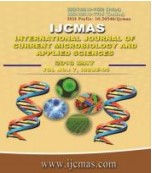


 National Academy of Agricultural Sciences (NAAS)
National Academy of Agricultural Sciences (NAAS)

|
PRINT ISSN : 2319-7692
Online ISSN : 2319-7706 Issues : 12 per year Publisher : Excellent Publishers Email : editorijcmas@gmail.com / submit@ijcmas.com Editor-in-chief: Dr.M.Prakash Index Copernicus ICV 2018: 95.39 NAAS RATING 2020: 5.38 |
Groundnut (Arachis hypogaea L.) is an important oil seed crop mainly grown under rainfed situation. Due to erratic rainfall and frequent drought during the crop growth period, groundnut yields are generally low and unstable under rainfed conditions. Drought during critical crop growth stages is crucial for yield in groundnut varieties. But tolerant genotypes may give better yield due to maintenance of physiological responses that were triggered during drought. On Farm Trials was conducted by Krishi Vigyan Kendra, Ariyalur to assess suitable drought tolerant and high yielding groundnut variety in terms of yield, acceptability and adoption potential during Kharif 2016-17 in Ariyalur district. The study revealed that CO 7 recorded higher pod yield (1880 kg/ ha), higher number of pods/plant (28.4), lesser root rot incidence (1.4 %), leaf spot incidence(26.0) and optimum plant population (29.1 plants/m2) as compared to others. A maintain optimum plant population and reduction in root rot incidence was observed in CO 7 and Kadiri 9 as compared to check variety. Gross and net returns were Rs.1, 05,567/- and Rs.64, 988/-ha, respectively by cultivating CO 7 as against Rs.76,183/- and Rs.33,484/-ha in the check variety. CO 7, kadiri 9 and GJG 9 would be a better option for rainfed cultivation in Ariyalur district.
 |
 |
 |
 |
 |